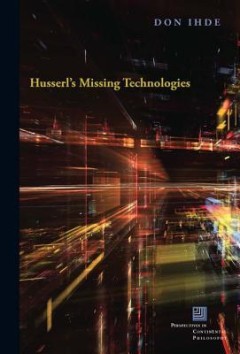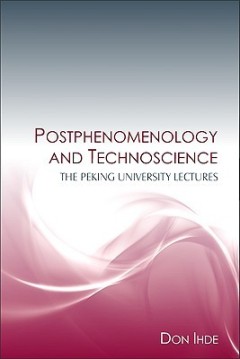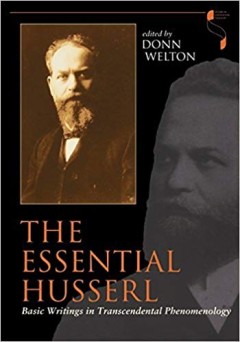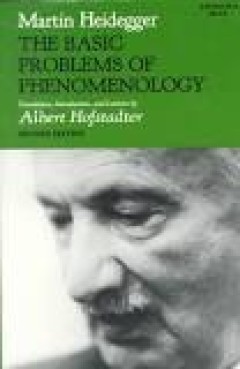Ditapis dengan

Existential Phenomenology
- Edisi
- Revised Edition
- ISBN/ISSN
- -
- Deskripsi Fisik
- 409 pgs.; 23,5 cm.
- Judul Seri
- Philosophical Series 12
- No. Panggil
- 108 LUI e
- Edisi
- Revised Edition
- ISBN/ISSN
- -
- Deskripsi Fisik
- 409 pgs.; 23,5 cm.
- Judul Seri
- Philosophical Series 12
- No. Panggil
- 108 LUI e

Husserl's Missing Technologies
Husserl's Missing Technologies looks at the early-twentieth-century "classical" phenomenology of Edmund Husserl, both in the light of the philosophy of science of his time, and retrospectively at his philosophy from a contemporary "postphenomenology." Of central interest are his infrequent comments upon technologies and especially scientific instruments such as the telescope and microscope. Tog…
- Edisi
- First Published
- ISBN/ISSN
- 978-0-8232-6961-7
- Deskripsi Fisik
- xviii + 157 pgs.; 20 cm.
- Judul Seri
- -
- No. Panggil
- 193 IHD h

Postphenomenology and Technoscience: The Peking University Lectures
A revised form of phenomenology, postphenomenology aims to overcome the limitations of subjectivism and its largely dystopian stance toward science and technology. Timely and insightful, this book provides a useful introduction to postphenomenology, asking how it can effectively transform classical phenomenology into a new and concrete reflection upon technoscience. Tracing the modern history o…
- Edisi
- First Published
- ISBN/ISSN
- 978-1-4384-2621-1
- Deskripsi Fisik
- ix + 92 pgs.; 23 cm.
- Judul Seri
- -
- No. Panggil
- 142.7 IHD p

The Essential Husserl: Basic Writings in Transcendental Phenomenology
- Edisi
- First Published
- ISBN/ISSN
- 0-253-21273-1
- Deskripsi Fisik
- xv + 386 pgs.; 25 cm.
- Judul Seri
- -
- No. Panggil
- 193 ESS e
- Edisi
- First Published
- ISBN/ISSN
- 0-253-21273-1
- Deskripsi Fisik
- xv + 386 pgs.; 25 cm.
- Judul Seri
- -
- No. Panggil
- 193 ESS e

The Basic Problems Of Phenomenology
A lecture course that Martin Heidegger gave in 1927, The Basic Problems of Phenomenology continues and extends explorations begun in Being and Time. In this text, Heidegger provides the general outline of his thinking about the fundamental problems of philosophy, which he treats by means of phenomenology, and which he defines and explains as the basic problem of ontology.
- Edisi
- -
- ISBN/ISSN
- 0253176867
- Deskripsi Fisik
- xxxi + 396 pg.; 24 cm.
- Judul Seri
- -
- No. Panggil
- 142.7 HEI b

Testing the Limit: Derrida, Henry, Leninas and the Phenomenological Tradition
In exploring the nature of excess relative to a phenomenology of the limit, Testing the Limit claims that phenomenology itself is an exploration of excess. What does it mean that "the self" is "given"? Should we see it as originary; or rather, in what way is the self engendered from textual practices that transgress—or hover around and therefore within—the threshold of phenomenologial disco…
- Edisi
- -
- ISBN/ISSN
- 9780804772747
- Deskripsi Fisik
- ix + 3210 pg.;
- Judul Seri
- -
- No. Panggil
- 142.7 SEB t

Phenomenology
- Edisi
- -
- ISBN/ISSN
- 0791408051
- Deskripsi Fisik
- vi + 147 pg.; 23 cm.
- Judul Seri
- -
- No. Panggil
- 142.7 LYO p
- Edisi
- -
- ISBN/ISSN
- 0791408051
- Deskripsi Fisik
- vi + 147 pg.; 23 cm.
- Judul Seri
- -
- No. Panggil
- 142.7 LYO p
 Karya Umum
Karya Umum  Filsafat
Filsafat  Agama
Agama  Ilmu-ilmu Sosial
Ilmu-ilmu Sosial  Bahasa
Bahasa  Ilmu-ilmu Murni
Ilmu-ilmu Murni  Ilmu-ilmu Terapan
Ilmu-ilmu Terapan  Kesenian, Hiburan, dan Olahraga
Kesenian, Hiburan, dan Olahraga  Kesusastraan
Kesusastraan  Geografi dan Sejarah
Geografi dan Sejarah